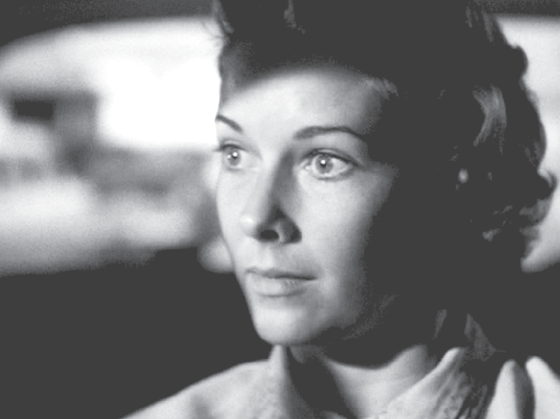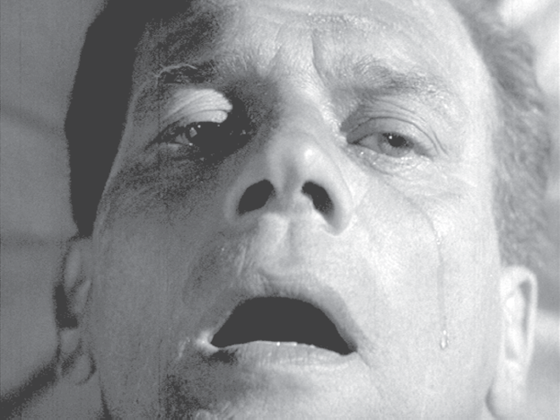“Breakdown” (1955), the seventh episode of the first season of Alfred Hitchcock Presents, was the one my fifth-grade classmates and I couldn’t stop talking about on the P. S. 181 playground in Brooklyn. It has haunted me ever since. It begins, as each of the episodes in this series does, with Hitchcock’s introduction. “I think you’ll find it properly terrifying,” he says, “but like the other plays of our series, it is more than mere entertainment. In each of our stories we strive to teach a lesson or point a little moral. Advice like mother used to give: You know, ‘Walk softly but carry a big stick.’ ‘Strike first and ask questions later’—that sort of thing. Tonight’s story tells about a business tycoon and will give you something to ponder.…You’ll see it after the sponsor’s story, which, like ours, also strives to teach a little lesson or point a little moral.”
“Breakdown” is, indeed, a morality play. William Callew (Joseph Cotten), a businessman, scoffs at the weakness of others and pays dearly for it. He is paralyzed in an automobile accident. Taken for dead when the authorities find him, he is only able to reveal that he is alive when, on the coroner’s slab, he gives up trying to control the situation and, breaking down, prays to God. His silent weeping produces a telltale tear.
This tear engenders a very different reaction than did Willi’s telltale beads of sweat. When the coroner sees it, he leans over to assure Callew that everything will now be all right. End of story. Except that Hitchcock appears again onscreen and says, with that inimitable knowing, bored, disdainful look to the camera, “Well, that was a bit of a near thing.”
Figure 9.1
There is such contempt in Hitchcock’s voice! But is he sharing this contempt with us or directing it at us? And what, or whom, does Hitchcock hold in such contempt? Surely, his sponsors, who won’t let him “tell it like it is” but insist on a happy ending, or at least a conventionally moral one, and those of his viewers whose eyes need to be opened to the gap between his sponsors’ rosy picture of the world and the way things really were in America of the 1950s (and perhaps, in every place and every time). And what won’t his sponsors let him tell? That the real world, unlike the world according to his sponsors, is not just or moral? (If it were, would Hitchcock have had to kowtow to “sponsors,” impersonal corporations that profit from exploiting human frailty?)
Does Hitchcock really believe that “Walk softly but carry a big stick” and “Strike first and ask questions later” typify the kind of advice that mothers give, or should give, to their children? Or does a mother’s love impart a different kind of lesson, the kind of lesson the Cotten character learns when he fails to acknowledge the humanity of others, hence his own humanity, and finds himself subjected to a horrendous comeuppance? When the car crash leaves him totally paralyzed (except for one little finger) and mistaken for dead, he learns in a hard way, indeed, that his ability to control his world, or even his own emotions, has limits. When he stops trying to assert control, the “miracle” happens. He is saved—if he counts being condemned to total paralysis as salvation. Unless his tearful prayer signals a full-fledged Emersonian awakening, such a life would feel like a fate worse than death to him.
Yet even as “Breakdown” is pointing this little moral, its author is asserting his own control over Callew’s fate. Hitchcock, not God, arranges the series of unlucky “accidents” that push this man to the breaking point. And when on the coroner’s slab Callew finally breaks down, prays and weeps, it is Hitchcock who intervenes to spare his life. In arrogating to himself the godlike power to mete out retribution and rescue, does not Hitchcock become, or reveal himself to be, no different from Callew, hence no less deserving of punishment, no less in need of learning the very lesson he calls upon Callew to learn?
Here, as elsewhere, Hitchcock’s reassuringly impish delivery masks his seriousness. Playing the jester gave him a license to speak truths that others on television consigned to silence. Yet for all his impishness, there is real vitriol in his voice, a palpable cruelty in his expression, as if it suits him just fine that the world is unjust and that he is the one opening our eyes to this reality. “Breakdown” points a little moral, which it also calls into question, even as it calls into question its own self-questioning. What could be more Hitchcockian?
Hitchcock returns after the final commercial break and prefaces his concluding remarks by saying, “There, now.” His voice is soothing, as if he were a mother who has just administered medicine to her sick child and is now reassuring herself that the ordeal wasn’t as bad as the little tyke had thought it would be. When Marnie’s injured horse finally stops struggling after she shoots the poor animal in the head at point blank range, she says “There, now” with exactly the same intonation, as if she believes she has put her beloved Forio to sleep, not merely figuratively but literally, and is satisfied that the bullet to the brain she has just administered was not too bitter a pill to swallow. The distinct echo of Hitchcock’s voice I hear in Tippi Hedren’s delivery of her line brings home both the sincerity of Marnie’s belief that her act of killing is an act of love and the mocking irony of Hitchcock’s suggestion that the “medicine” his sponsors have just slipped down our throats does more than put us to sleep. It blows out our brains.
In his appearances on Alfred Hitchcock Presents, Hitchcock expressed his contempt for the Gospel According to 1950s Television, the world as Hitchcock’s sponsors would have viewers believe it really was—a world in which father knows best that morality always pays and crime never does and that marrying, raising children in the suburbs, and buying products that may or may not be needed guarantee living happily ever after. Hitchcock’s words and tone intimate that he knows better. And what he knows is that no one’s motives—including our own—can be trusted to be pure and that in reality there is no guarantee that good will prevail or that trust will be rewarded.
Then did Hitchcock truly believe that the world is a “foul sty,” as another Joseph Cotten character, Uncle Charlie in Shadow of a Doubt, rather hyperbolically puts it? Nowhere does Hitchcock present a darker vision than in “Revenge” (1955). This, the very first episode of Alfred Hitchcock Presents, brilliantly set the tone for the series and served as a kind of study for The Wrong Man (1956), one of his great masterpieces.
When in “Revenge” Carl (Ralph Meeker) comes home from his new job, he finds his wife, Elsa (Vera Miles), on the floor, evidently having been attacked by a brutal intruder who left her in an almost catatonic, trancelike state similar to that into which Rose Balestrero (another Vera Miles character), in The Wrong Man, withdraws after her breakdown. (We recognize this state from other Hitchcock films as well. Alice White in Blackmail is in such a state after she kills the artist who tries to rape her, as is Diana Baring in Murder! after she witnesses a murder she will be wrongly accused of committing. Scottie is in such a state after he sees, or so he thinks, Madeleine fall to her death in Vertigo. So is Melanie, in The Birds, after the attack in the attic.)
When the traumatized Elsa keeps repeating, in a flat, affectless voice, “He killed me, he killed me,” Carl announces his intention—his wife emerges enough from her trance to say “Yes” and nod her approval—to track down and kill the brute who did this. Driving into town from their trailer park—unlike Hitchcock’s movies of the 1950s other than The Wrong Man, episodes of Alfred Hitchcock Presents often have working-class protagonists; they are more “slices of life” than “pieces of cake,” as Hitchcock liked to call his theatrical films—Carl and Elsa pass a man walking on the street. Elsa exclaims, “There he is! That’s him. That’s him!” So Carl follows the man to his hotel and, with a monkey wrench, bludgeons him to death. As they are driving home, however, Elsa spots another man on the street. “There he is! That’s him. That’s him!” she says of this man, too. This time, Elsa speaks these words with the barest trace of a smile that chillingly intimates, or at least hints, that she really knows exactly what she has done to her husband—and that she has done it deliberately, in a spirit of revenge.

Figure 9.2
Echoing the ending of Rope, the sound of a distant siren grows ominously louder.


